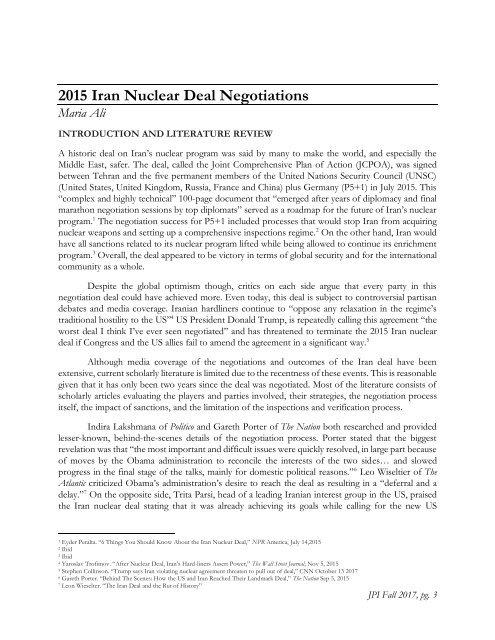Fall 2017 JPI
Create successful ePaper yourself
Turn your PDF publications into a flip-book with our unique Google optimized e-Paper software.
2015 Iran Nuclear Deal Negotiations<br />
Maria Ali<br />
INTRODUCTION AND LITERATURE REVIEW<br />
A historic deal on Iran’s nuclear program was said by many to make the world, and especially the<br />
Middle East, safer. The deal, called the Joint Comprehensive Plan of Action (JCPOA), was signed<br />
between Tehran and the five permanent members of the United Nations Security Council (UNSC)<br />
(United States, United Kingdom, Russia, France and China) plus Germany (P5+1) in July 2015. This<br />
“complex and highly technical” 100-page document that “emerged after years of diplomacy and final<br />
marathon negotiation sessions by top diplomats” served as a roadmap for the future of Iran’s nuclear<br />
program. 1 The negotiation success for P5+1 included processes that would stop Iran from acquiring<br />
nuclear weapons and setting up a comprehensive inspections regime. 2 On the other hand, Iran would<br />
have all sanctions related to its nuclear program lifted while being allowed to continue its enrichment<br />
program. 3 Overall, the deal appeared to be victory in terms of global security and for the international<br />
community as a whole.<br />
Despite the global optimism though, critics on each side argue that every party in this<br />
negotiation deal could have achieved more. Even today, this deal is subject to controversial partisan<br />
debates and media coverage. Iranian hardliners continue to “oppose any relaxation in the regime’s<br />
traditional hostility to the US” 4 US President Donald Trump, is repeatedly calling this agreement “the<br />
worst deal I think I’ve ever seen negotiated” and has threatened to terminate the 2015 Iran nuclear<br />
deal if Congress and the US allies fail to amend the agreement in a significant way. 5<br />
Although media coverage of the negotiations and outcomes of the Iran deal have been<br />
extensive, current scholarly literature is limited due to the recentness of these events. This is reasonable<br />
given that it has only been two years since the deal was negotiated. Most of the literature consists of<br />
scholarly articles evaluating the players and parties involved, their strategies, the negotiation process<br />
itself, the impact of sanctions, and the limitation of the inspections and verification process.<br />
Indira Lakshmana of Politico and Gareth Porter of The Nation both researched and provided<br />
lesser-known, behind-the-scenes details of the negotiation process. Porter stated that the biggest<br />
revelation was that “the most important and difficult issues were quickly resolved, in large part because<br />
of moves by the Obama administration to reconcile the interests of the two sides… and slowed<br />
progress in the final stage of the talks, mainly for domestic political reasons.” 6 Leo Wiseltier of The<br />
Atlantic criticized Obama’s administration’s desire to reach the deal as resulting in a “deferral and a<br />
delay.” 7 On the opposite side, Trita Parsi, head of a leading Iranian interest group in the US, praised<br />
the Iran nuclear deal stating that it was already achieving its goals while calling for the new US<br />
1 Eyder Peralta. “6 Things You Should Know About the Iran Nuclear Deal,” NPR America, July 14,2015<br />
2 Ibid<br />
3 Ibid<br />
4 Yaroslav Trofimov. “After Nuclear Deal, Iran’s Hard-liners Assert Power,” The Wall Street Journal, Nov 5, 2015<br />
5 Stephen Collinson. “Trump says Iran violating nuclear agreement threaten to pull out of deal,” CNN October 13 <strong>2017</strong><br />
6 Gareth Porter. “Behind The Scenes: How the US and Iran Reached Their Landmark Deal,” The Nation Sep 5, 2015<br />
7 Leon Wieselter. “The Iran Deal and the Rut of History”<br />
<strong>JPI</strong> <strong>Fall</strong> <strong>2017</strong>, pg. 3
















